Bohol
VIP
The meeting was meant to have been top-secret. The men gathered inside the room were the most powerful in northern Ethiopia’s Amhara region.
The agenda before them was incendiary: the removal of Asamnew Tsige, the regional security chief whose shadowy ambitions had chilled the Ethiopia establishment.
But somehow Mr Asamnew had got wind of what was afoot.
Unknown to the participants, a convoy of his loyalists, armed and dressed in unfamiliar camouflage, was advancing towards them along the palm-lined avenues of Bahir Dar, Amhara’s capital.
Moments after they entered Amhara’s regional headquarters, the meeting room would be splattered in blood and gore. The region’s president and his chief aide lay dead.
Survivors emerging from under tables ripped curtains off their hooks in a vain attempt to staunch the wounds of Amhara’s dying attorney-general. Events were only just getting underway.
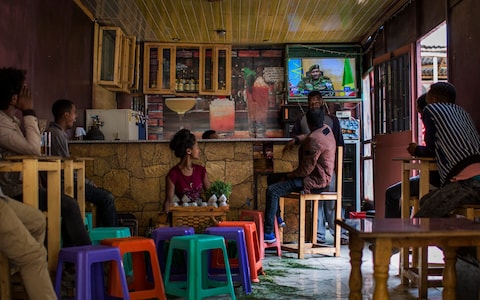
Ethiopia's government foiled a coup attempt in a region north of the capital and the country's military chief was shot dead, the prime minister Abiy Ahmed CREDIT: AP
Elsewhere in Bahir Dar, Asamnew loyalists reportedly attempted to storm the city’s police headquarters and state media building.
Hours later came more killings, the most startling of them all, as Ethiopia’s powerful army chief, Seare Mekonnen, and a visiting retired general were shot dead while they ate their dinner in the country’s capital Addis Ababa, 300 miles to the south.
The motivation for last weekend’s attacks, and whether they were even connected, remains unclear.
Ethiopia’s government, which had shut down the internet days before the killings, released few details and sought to control the narrative by claiming to have thwarted a regional coup. Others were more sceptical, suggesting that the violence may have been unplanned.
Whatever the truth, the assassinations have laid bare the profoundly disturbing dangers facing Ethiopia.
Under its dynamic young prime minister, Abiy Ahmed, Ethiopia has been held up over the past year as one of Africa’s most promising states.
But beneath the exciting reforms, much of the country is seething. Some 3.2m people have fled communal violence that has erupted in pockets across the country in the past 18 months, more than in Syria, Iraq, Yemen and Somalia combined, leading to warnings of a humanitarian disaster.
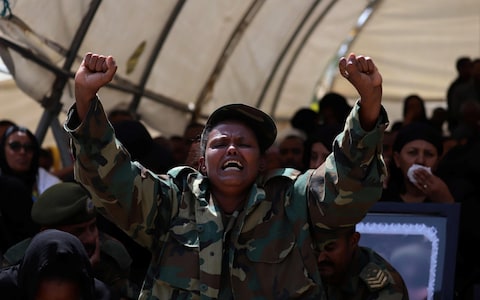
Ethiopian army member reacts as she salutes to a flag-draped coffin of Ethiopian Army Chief of Staff, Seare Mekonnen who got killed by his bodyguard, in Mekele CREDIT: REUTERS
“Ethiopia is the definition of a forgotten crisis,” said Jan Egeland, secretary-general of the Norwegian Refugee Council.
“The scale and quality of the humanitarian response is grossly inadequate.”
As dire as the situation already is, it could just be the beginning, however. Observers and diplomats warn the country is moving closer to cataclysm, with rising ethnic tensions possibly even threatening to engulf a country of 110 million people in a Yugoslav-style secessionist conflagration.
“The situation is extremely fragile in Ethiopia,” says a Western official.
“It would not take much to tip it over the edge.” After decades of rule by military strongmen, Mr Abiy’s appointment as prime minister in April last year ushered in a period of breakneck reforms.
Thousands of political prisoners released. Exiles were invited home as bans on opposition groups including ones that had taken up arms against the government, like the Ginbot 7 movement to which Mr Asamnew, freed after a decade in jail on coup plotting charges, belonged.
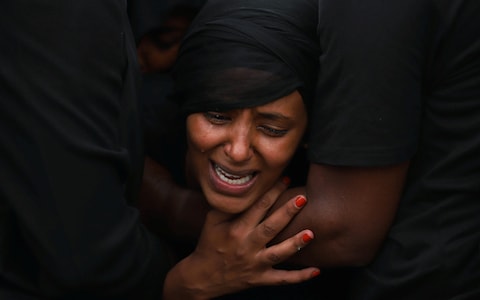
A peace deal with neighbouring Eritrea was signed, ending years of instability that followed a bloody border war which erupted in 1998. Mr Abiy pulled in billions of dollars in new aid and investment to help prop up a debt-ridden economy.
The new prime minister had to move fast in order to outflank hardline elements of the old regime whose interests were threatened.
Many analysts now suggest he moved too fast. In 1995, a new constitution divided the country into nine ethnically based semi-autonomous regions.
Mr Abiy’s democratic reforms have given breathing room to ethnic ambitions his repressive predecessors were able to keep in check.
Ethnic parties, many of them with an openly chauvinistic message, have mushroomed, playing on old communal grievances, reigniting territorial border disputes and claiming the ethnic persecution of their kinsmen living in other regions.
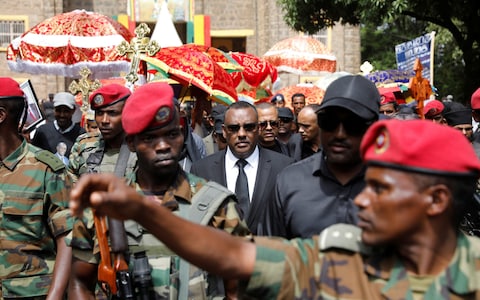
Ethiopia's deputy prime minister Mekonnen attends the funeral of Amhara president Mekonnen and two other officials in Bahir Dar CREDIT: REUTERS
In this respect, there are strong parallels with Yugoslavia in the 1990s, where a federal state organised along ethnic lines broke up over similar tensions, says Florian Bieber, a Balkans specialist at the University of Graz in Austria and until recently a visiting professor at Addis Ababa University.
“In an ethno-federal state like Ethiopia is and like Yugoslavia was, power is very much claimed along ethnic lines,” he said.
“The very quick and in many ways very welcome opening up of the country has created the opportunity for competition between different ethnic claims.”
Like in Yugoslavia, many Ethiopian regions are dominated by a single group but have sizeable minorities living in others. Attacks on minorities have proliferated in several of them.
Tit-for-tat violence between Gumuz and Amhara groups in Benishangul-Gumuz, which neighbours Amhara, killed more than 200 people in May.
Last year, scores of people died in Addis Ababa in clashes between the local Oromo population, Ethiopia’s biggest ethnic group, and non-Oromo minorities.
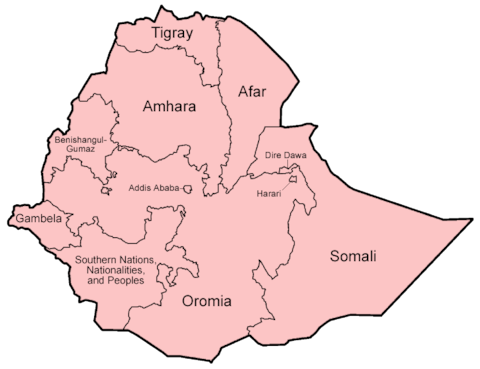
Will ethnic federalism lead to Ethiopia's disintegration?
Most worryingly, ethnic militias have also sprouted in parts of the country, many of them run by regime figures.
Last weekend’s attacks in Amhara, where there is nostalgia for the days it dominated Ethiopia before the overthrow of Emperor Haile Selassie in 1974, were carried out by one such outfit.
It had been formed by Mr Asamnew who emerged as hardline champion of Amhara interests and whise appointment as security chief was meant to be a sop to Amhara nationalists.
The gesture failed. Mr Abiy has now responded to tje threat with a old-fashioned clampdown. Scores of Amhara nationalists have been detained.
Mr Asamnew was killed in a shootout last week, restoring calm but potentially creating an Amhara martyr. The prime minister now faces a dilemma: a return to repression risks enflaming ethnic grievances, but continuing reform is equally dangerous.
The small Tigrayan minority, which dominated Ethiopia until Mr Abiy’s inauguration, is seething, resentful over its displacement and the detention of some of its leaders after they were accused of human-rights abuses.
“The talk is of either confrontation or secession,” a local politician in the Tigray region said. Ethiopia can still avert disaster, observers say, but it will require defter handling by Mr Abiy and a more wholehearted attempt to build consensus across ethnic lines.
“There are a lot of smallish fires burning,” the Western official said. “He needs to reach out better, otherwise we are looking at a pretty frightening array of potential outcomes."
https://www.telegraph.co.uk/news/20...R-pPYKd4uTI3zHMSvUemG7TyJWVwkLlgc2gmJkQaA6YHY
The agenda before them was incendiary: the removal of Asamnew Tsige, the regional security chief whose shadowy ambitions had chilled the Ethiopia establishment.
But somehow Mr Asamnew had got wind of what was afoot.
Unknown to the participants, a convoy of his loyalists, armed and dressed in unfamiliar camouflage, was advancing towards them along the palm-lined avenues of Bahir Dar, Amhara’s capital.
Moments after they entered Amhara’s regional headquarters, the meeting room would be splattered in blood and gore. The region’s president and his chief aide lay dead.
Survivors emerging from under tables ripped curtains off their hooks in a vain attempt to staunch the wounds of Amhara’s dying attorney-general. Events were only just getting underway.

Ethiopia's government foiled a coup attempt in a region north of the capital and the country's military chief was shot dead, the prime minister Abiy Ahmed CREDIT: AP
Elsewhere in Bahir Dar, Asamnew loyalists reportedly attempted to storm the city’s police headquarters and state media building.
Hours later came more killings, the most startling of them all, as Ethiopia’s powerful army chief, Seare Mekonnen, and a visiting retired general were shot dead while they ate their dinner in the country’s capital Addis Ababa, 300 miles to the south.
The motivation for last weekend’s attacks, and whether they were even connected, remains unclear.
Ethiopia’s government, which had shut down the internet days before the killings, released few details and sought to control the narrative by claiming to have thwarted a regional coup. Others were more sceptical, suggesting that the violence may have been unplanned.
Whatever the truth, the assassinations have laid bare the profoundly disturbing dangers facing Ethiopia.
Under its dynamic young prime minister, Abiy Ahmed, Ethiopia has been held up over the past year as one of Africa’s most promising states.
But beneath the exciting reforms, much of the country is seething. Some 3.2m people have fled communal violence that has erupted in pockets across the country in the past 18 months, more than in Syria, Iraq, Yemen and Somalia combined, leading to warnings of a humanitarian disaster.

Ethiopian army member reacts as she salutes to a flag-draped coffin of Ethiopian Army Chief of Staff, Seare Mekonnen who got killed by his bodyguard, in Mekele CREDIT: REUTERS
“Ethiopia is the definition of a forgotten crisis,” said Jan Egeland, secretary-general of the Norwegian Refugee Council.
“The scale and quality of the humanitarian response is grossly inadequate.”
As dire as the situation already is, it could just be the beginning, however. Observers and diplomats warn the country is moving closer to cataclysm, with rising ethnic tensions possibly even threatening to engulf a country of 110 million people in a Yugoslav-style secessionist conflagration.
“The situation is extremely fragile in Ethiopia,” says a Western official.
“It would not take much to tip it over the edge.” After decades of rule by military strongmen, Mr Abiy’s appointment as prime minister in April last year ushered in a period of breakneck reforms.
Thousands of political prisoners released. Exiles were invited home as bans on opposition groups including ones that had taken up arms against the government, like the Ginbot 7 movement to which Mr Asamnew, freed after a decade in jail on coup plotting charges, belonged.

A peace deal with neighbouring Eritrea was signed, ending years of instability that followed a bloody border war which erupted in 1998. Mr Abiy pulled in billions of dollars in new aid and investment to help prop up a debt-ridden economy.
The new prime minister had to move fast in order to outflank hardline elements of the old regime whose interests were threatened.
Many analysts now suggest he moved too fast. In 1995, a new constitution divided the country into nine ethnically based semi-autonomous regions.
Mr Abiy’s democratic reforms have given breathing room to ethnic ambitions his repressive predecessors were able to keep in check.
Ethnic parties, many of them with an openly chauvinistic message, have mushroomed, playing on old communal grievances, reigniting territorial border disputes and claiming the ethnic persecution of their kinsmen living in other regions.

Ethiopia's deputy prime minister Mekonnen attends the funeral of Amhara president Mekonnen and two other officials in Bahir Dar CREDIT: REUTERS
In this respect, there are strong parallels with Yugoslavia in the 1990s, where a federal state organised along ethnic lines broke up over similar tensions, says Florian Bieber, a Balkans specialist at the University of Graz in Austria and until recently a visiting professor at Addis Ababa University.
“In an ethno-federal state like Ethiopia is and like Yugoslavia was, power is very much claimed along ethnic lines,” he said.
“The very quick and in many ways very welcome opening up of the country has created the opportunity for competition between different ethnic claims.”
Like in Yugoslavia, many Ethiopian regions are dominated by a single group but have sizeable minorities living in others. Attacks on minorities have proliferated in several of them.
Tit-for-tat violence between Gumuz and Amhara groups in Benishangul-Gumuz, which neighbours Amhara, killed more than 200 people in May.
Last year, scores of people died in Addis Ababa in clashes between the local Oromo population, Ethiopia’s biggest ethnic group, and non-Oromo minorities.

Will ethnic federalism lead to Ethiopia's disintegration?
Most worryingly, ethnic militias have also sprouted in parts of the country, many of them run by regime figures.
Last weekend’s attacks in Amhara, where there is nostalgia for the days it dominated Ethiopia before the overthrow of Emperor Haile Selassie in 1974, were carried out by one such outfit.
It had been formed by Mr Asamnew who emerged as hardline champion of Amhara interests and whise appointment as security chief was meant to be a sop to Amhara nationalists.
The gesture failed. Mr Abiy has now responded to tje threat with a old-fashioned clampdown. Scores of Amhara nationalists have been detained.
Mr Asamnew was killed in a shootout last week, restoring calm but potentially creating an Amhara martyr. The prime minister now faces a dilemma: a return to repression risks enflaming ethnic grievances, but continuing reform is equally dangerous.
The small Tigrayan minority, which dominated Ethiopia until Mr Abiy’s inauguration, is seething, resentful over its displacement and the detention of some of its leaders after they were accused of human-rights abuses.
“The talk is of either confrontation or secession,” a local politician in the Tigray region said. Ethiopia can still avert disaster, observers say, but it will require defter handling by Mr Abiy and a more wholehearted attempt to build consensus across ethnic lines.
“There are a lot of smallish fires burning,” the Western official said. “He needs to reach out better, otherwise we are looking at a pretty frightening array of potential outcomes."
https://www.telegraph.co.uk/news/20...R-pPYKd4uTI3zHMSvUemG7TyJWVwkLlgc2gmJkQaA6YHY






